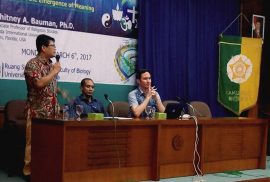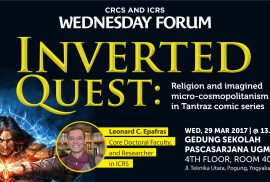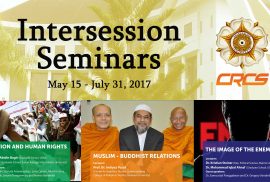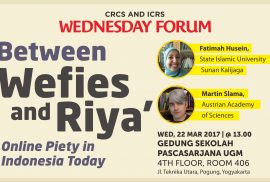Anang G Alfian | CRCS | News

Universitas Gadjah Mada’s Faculty of Biology invited Whitney Bauman to present his on-going project at the Biology Hall on Monday, March 6th, 2017. Students and lecturers from various faculties came to hear his lecture. His specialization on the discourse of religion, science, and nature reflects his capacity as an associate professor at the Department of Religious Studies, Florida International University, as well as author of works including Theology, Creation, and Environmental Ethics (Routledge 2009) and Religion and Ecology: Developing a Planetary Ethics (2014). A longtime friend of CRCS who has taught intersession courses more than once, he is currently working to finish his third, single-authored book with a tentative title Truth, Beauty and Goodness: Ernst Haeckel and Religious Naturalism.
In his lecture, introduced by paleontology lecturer Donan Satria Yudha as the moderator, Bauman engaged religion and science in a contemporary discussion to look for a new way of understanding each through an evolutionary perspective. This perspective of religion-science relationship was inspired by the contemporary phenomenon in which religion has gained more spaces within science.
The emphasis Bauman made in the beginning of the lecture pointed out the direction of his topic of presentation. He started how historically the notion of religion has been discussed by different perspectives from dualism and reductionism to emergence theory. Along with the continuum of religion-science relationship, he challenged to look at the relation in a new way by focusing on the German scientist Ernst Haeckel (1834-1919) who formulated a new way of making sense out of the world through his studies of ecology and evolution. Bauman clearly stated his stance: “to place Haeckel’s Monism in continuity with this tradition of meaning-making.” He also emphasized that everything has undergone changes and the way we understand the relation between religion and science has always been a “relationship in constant flux.” He challenged the assumption of the previous models on religion-science relationship that views Religion and Science as two different traditions. “I argue that Religion and Science are always together, influencing one another,” Bauman continued, “there is no clear separation.”
As Bauman prefers to define “religion” through its meaning-making function, he observed that the way religion attains knowledge is also inseparable from the natural evolution perspective. Further, he explained that the relation involves not only human and nature as a traditional dichotomy but more as an interconnectedness of everything. This view triggered questions from the audience.
One member of the audience asked a question on a human special status over the rest of nature which challenged the way certain traditions or religions view the status of humans in their scriptures. “I am not sure if humans have a special status in nature,” Bauman answered, “In fact, not only humans have culture and language; many other creatures might have them too.” Because knowledge is always in process and moves together with history and experiences, he argued that it is normal for many traditions to have different understandings of nature and the Truth.
Another question posed was about whether the first human walking on earth was the one as narrated in the scripture. Baumann referred to “Adam” as mentioned in the Genesis as its literal meaning, i.e. a creature on the earth which did not refer to any specific gender. In addition, Donan Satria Yudha said that some Muslim scientists say that Homo sapiens may constitute the first human as mentioned in the scripture and it refers to the quality of being human in the evolution, and not to a specific figure.
The writer, Anang G Alfian, is CRCS student of the 2016 batch
2017

Abstract
As suggested by Ben Anderson, media is a powerful means in creating imagined community and accordingly in establishing a sense of cosmopolitanism. Taking this insight, the presentation will explore the rethoric represented in the series of comic under the title Baladeva, published by Tantraz Comiks (/Comics) Bali, Denpasar. The comic will be framed within the notion of micro-cosmopolitanism—a cosmopolitanism from below (Cronin, 2006)—through which the pressing questions of imagination of nationalism and cosmopolitanism, counter-transnational religious discourse, and religious minority are played out. Contemplating the present day contestation between nationalism and transnationalism discourse, understanding contemporary comics to a degree might illuminate the shift in the present Indonesia, notably from the perspective of popular culture.
Speaker
Leonard Chrysostomos Epafras is a core doctoral faculty and researcher at the Indonesian Consortium for Religious Studies, at the Graduate School of UGM. His research projects include Jewish Studies, Digital Humanities, and Pop-Culture Studies.
Look at the full poster here.
Kate Wright | CRCS | Voices from America
Sejak tujuh belas tahun lalu, CRCS telah terhubung erat dengan para akademisi Amerika Serikat. Beberapa pelopor studi antaragama dari Amerika, seperti John Raines, Mahmud Ayoub, dan Paul Knitter, telah membantu dalam pendirian dan pengembangan CRCS. Banyak dosen tamu dan para pengajar bahasa Inggris dari Amerika telah mengajar di CRCS. Lebih dari 30 alumni CRCS kini juga telah melanjutkan studinya, untuk tingkat MA atau PhD, di universitas-universitas Amerika. Sehubungan dengan pelbagai kabar politik pascapemilu Amerika, juga fenomena yang serupa di negara-negara lain di Eropa dan Asia, kami mengundang para kolega dan relasi kami dari Amerika untuk menuliskan pandangan atau refleksi personal mereka di situs web CRCS. Artikel berikut ini, yang ditulis Kate Wright, adalah yang pertama untuk seri “Voices from America”. Versi orisinal dari tulisan ini dalam bahasa Inggris dapat dibaca di sini.
Kate Wright | CRCS | Voices from America
The United States and Indonesia are both plural societies that struggle to understand how to live together in diversity and with the meaning of pluralism itself. From its beginnings seventeen years ago, CRCS has had strong ties with American academia. Pioneers in inter-religious studies from the U.S., including John Raines, Mahmud Ayoub and Paul Knitter, were present at our founding and have been followed by a number of visiting lecturers who have stayed for a few weeks, months, or years, and by generations of English teachers. In addition, more than thirty CRCS alumni/ae have continued their studies for MA and PhD degrees in American universities. As we followed the news of the U.S. election within the context of the anti-pluralist turns across Asia and Europe, we wanted to know what our American friends are thinking and so we invited them to contribute their reflections to this page. This is the first of the Voices from America series. To read the Indonesian translation of this article, click here. To read the second of the series, click here.

INTERSESSION SEMINARS 2017
CRCS welcomes graduate students and the public to enroll in the following intersession seminars on religious and cross-cultural studies for credit or as auditors. Each course is offered for 3 credits (SKS). All courses are conducted in English. Each meets twice weekly, 3 hours per meeting, for a total of twelve meetings. The courses will be held between May 15 and July 31, with a two-week break for the Eid holiday. For further info, please contact Lina Pary at crcs@ugm.ac.id; office: 0274-544976.

Abstract
The presenters examine popular forms of online piety in Indonesia. They are particularly concerned how Indonesian Muslims try to cope with the ambivalences that their social media practices inevitably generate. These practices range from taking wefies (selfies of a group of people) at religious events that are posted on social media platforms, participating in online Quran reading groups, various form of online da’wah (proselytization) to documenting one’s pilgrimages and meetings with Islamic figures online. Given the importance of visibility that these social media practices entail, the presentation has a special focus on the concept of riya’ (showing off one’s piety) reminding Muslims to avoid that behavior. Arguing that discussions about riya’ have experienced a kind of revival in today’s social media age, the presenters attempt to point out that online piety is inherently ambiguous eliciting a dynamic of discourses and practices that considerably informs the current field of Islam in Indonesia today.
Speaker
Fatimah Husein teaches at the State Islamic University Sunan Kalijaga Yogyakarta. Her latest article entitled “The Revival of Riya’: Displaying Muslim Piety Online in Indonesia” has been submitted for a virtual issue of American Ethnologist.
Martin Slama is a researcher at the Institute for Social Anthropology, Austrian Academy of Sciences. His latest publications include “A Subtle Economy of Time: Social Media and the Transformation of Indonesia’s Islamic Preacher” Economy (Economic Anthropology 4:1, 2017).
Look at the full poster here.






